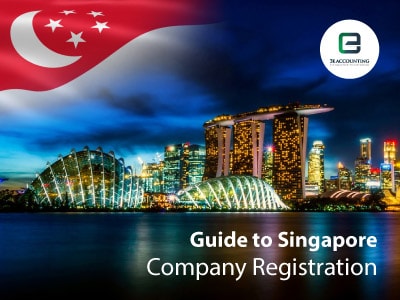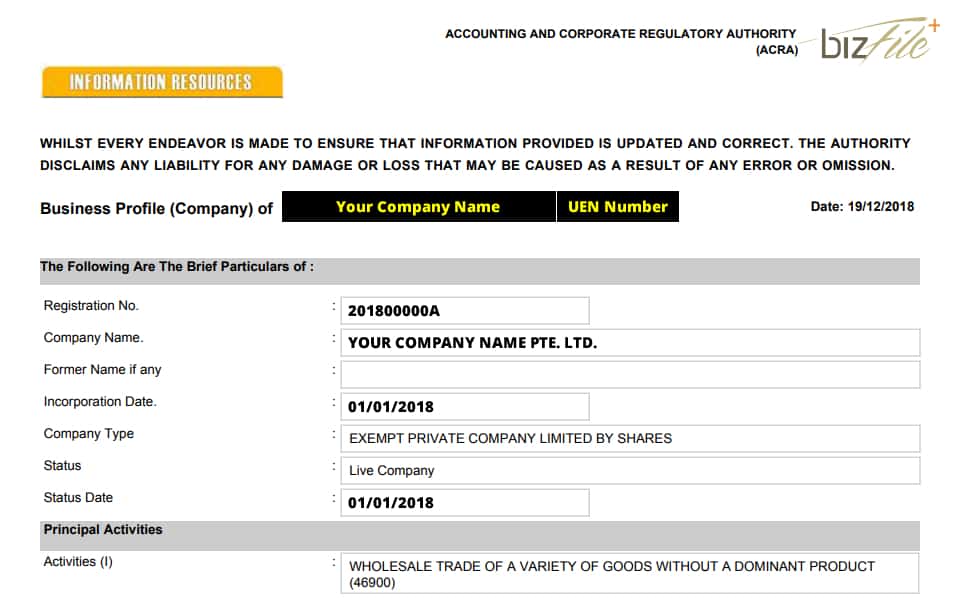Guide to Singapore Company Registration in 2025
This guide will help you understand how to start a business, register a company in Singapore, and provide insights on company registration in Singapore for foreigners.
Like any modern country, Singapore has several requirements for Singapore company incorporation that you must comply with when you want to start registering a company in Singapore and operating a business here.
Foreigners cannot register Pte Ltd’s company in Singapore via self-registration.
In Singapore, creating a private limited liability company is the most common way to register a new or relocated business or start a business and open a company in Singapore.
A limited company in Singapore is a separate legal entity that protects shareholders from debts beyond the capital they contribute. Considering this structure, it’s important to understand the cost of setting up a company in Singapore, as various factors influence the expenses involved. Incorporating a company in Singapore involves several key steps that impact the overall cost, and company incorporation services can guide you through the process.
The rules for registering a company in Singapore are outlined in the Singapore Companies Act, which allows anyone over 18 to register a Singapore company. Singapore’s company registration form offers the most efficient tax structure for a company incorporation.
You can consider 3E Accounting for your Singapore incorporation services, which includes a company secretary, which you must have within six months.
| Offer: | S$109 with GST |
| Contact Number: | +65 6690 9262 |
| Email: | [email protected] |
Things To Know Before You Register the Company in Singapore
Keep in mind the following company information you’ll need to provide for registering a business in Singapore or company registration in Singapore for foreigners:
- Company Name. You must receive approval for your new company name before registering your business in Singapore.
- Directors. You must have at least one Resident Director in Singapore. This person can be a citizen, permanent resident, or someone with a valid employment pass or dependent pass. You can appoint as many local and foreign directors as you want. You must ensure they are no younger than 18, have a clean criminal record and can’t suffer from bankruptcy. Directors need not be shareholders.
- Shareholders. For a Private Limited Company, you can have between one and 50 shareholders. Shareholders can be individuals or entities, local or foreign. After incorporation, you can issue or transfer shares to shareholders. Your Company is considered an Exempt Private Company (EPC) if the private company has at most 20 shareholders and No corporation holds (directly or indirectly) any beneficial interest in the EPC’s shares. EPC will enjoy audit exemption if the Company fulfils the small company requirement. A minimum of one shareholder is required. 100% foreign ownership is allowed.
- Company Secretary. Under the Singapore Companies Act, Section 171, you have six months to appoint a qualified company secretary once you incorporate. A sole director or shareholder can’t also be the company secretary; they must be a natural person living in Singapore.
- Paid-up Capital. Your company must have at least S$1 in paid-up capital to register as a Pte Ltd company in Singapore, though you can increase the amount at any time after incorporation. Singapore companies do not use authorized capital. It can be ordinary shares, preference shares or other shares.
- Registered Address. You must register a local business address to register a Pte Ltd company in Singapore. It can be residential or commercial, but it can’t be a post office box. Under the Home Office Scheme, homeowners can conduct small-scale businesses using their residential premises. This scheme applies to both HDB and private properties. Application for approval under the Home Office Scheme can be submitted to HDB or URA before or after business/company registration with ACRA.
- Taxation. You’ll love Singapore’s tax exemptions and incentives:
- Pay no more than 8.5 per cent tax on your first S$300,000 annual profits and 17 per cent after that.
- Forget about dividend or capital gains taxes.
- Bask in the knowledge that Singapore companies enjoy some of the world’s best tax benefits and business reputations.
- Check the Singapore Corporate Tax Guide for more details.
Types of Companies You Can Register in Singapore
Singapore’s three most common business entities are sole proprietorship, limited liability partnership and private limited company. Singapore incorporation services can assist with setting up any of these entities.
| Types of Companies Structure | Sole Proprietorship | Limited Liability Partnership | Private Limited Company |
|---|---|---|---|
| Suitable For | Individual with low risk. | Professional firms such as accountancy, law and architecture. | Businesses with projected growth, which may require additional funding for expansion. |
| Advantages | Low cost setup. | Low cost setup with limited liability protection. | Tax exemptions - first S$100,000 of net profit each year is tax at 4.25% and the next S$100.000 taxed at 8.5 percent for the first three years. More government grants are available for a PLC. |
| Disadvantages | Personal assets not protected. | Taxed at the individual level and requires paying a personal income tax rate that is higher than the corporate tax rate. | Compliance obligations such as financial reports, AGMs, etc. |
| Ownership | - Singapore Residents- Foreigners and corporations allowed only with appointment of a local manager | - Singapore Residents- Foreigners and corporations allowed only with appointment of a local manager | - 100 percent foreign or locally owned. No foreign shareholding restrictions.- Minimum one Singapore resident director required (We can provide you with nominee services). |
| Separate Legal Entity | No | Yes | Yes |
| Cap on Number of Members | One | Unlimited | Maximum 20 for exempt companies |
| Minimum Setup Requirement | One owner | Two partners | One shareholder and one director (the same individual can be both) |
| Limited Liability | No | Yes. The partners of a LLP will not be held personally liable for any business debts incurred by the LLP. However a partner may be held personally liable for claims from losses resulting from his own wrongful act or omission. But a partner shall not be personally liable for such wrongful acts or omissions of any other partner of the LLP. | Yes |
| Audit of Accounts | No | No | The Company will enjoy audit exemption if it is fulfilled the small company requirement. |
| Tax Treatment | Taxed at personal income tax rate (max is 22 percent) | Taxed at personal income tax rate (max is 22 percent) | Taxed at corporate income tax rate (max is 17 percent) |
| Cessation of Business upon Death of a Member/Partner | Yes | No. Any change in the partners will not affect its existence, rights or liabilities. | No. Equity shares go on in perpetuity. |
| Annual Compliance cost | Bookkeeping, Taxation service is required. | Bookkeeping, Taxation service is required. LLP is required to submit Form P to IRAS on annual basis. Each partners are required to report their LLP income or loss in their Form B as well. | Bookkeeping, Taxation service is required. In addition, you will need the secretarial services and prepare a set of unaudited financial statement which will cost you extra of $535 for each service. However, you will enjoy higher tax exemption and more government grant. For example, in Year of Assessment (YA) 2012, companies will receive a one-off, non-taxable SME cash grant of S$5,000. This cash grant is given to help companies offset the high costs which may persist in a business slowdown and is large enough to cover your annual compliance costs. |
Learn more about the types of companies in Singapore to choose the correct business entity for sole proprietors vs. LLPs vs. companies in Singapore.
Considerations for Foreigners on How to Register Company in Singapore

- The director and shareholder records are publicly accessible (at the fee of $5.50).
- Do not attempt to self-register your company. Foreigners are forbidden from doing this in Singapore.
- You won’t need a Singapore visa if you want to run your Singapore company but not live in Singapore. You can operate the company from anywhere in the world and visit on a short-term basis using a visitor visa. But you’ll need to have a local director living in Singapore.
- You’ll need an Employment Pass or Entrepreneur Pass to operate the company locally. With this pass, you can be the company’s resident director.
- 3E Accounting can handle all aspects of your company’s incorporation and work permit acquisition without you setting foot in Singapore. You might have to be present to open a bank account — it depends on the particular bank.
Required Information and Documents for Singapore Company Incorporation
The Company Registrar will need the following information and documents for Singapore Company Formation:
- Company Name
- Brief Description of Business Activities
- Shareholders Particulars
- Directors Particulars
- Registered Address
- Company Secretary Particulars
- Memorandum and Articles of Association (MAA). Singapore Company Registrar provides a standard MAA document suitable for most instances.
Generally, there are no restrictions except for financial services related or other politically sensitive businesses.
3E Accounting will collect the following documents to help you register your company at a reasonable Singapore company registration cost:
| Non-Residents (Foreigners) | Copy of passport, overseas residential address proof, and other Know-Your-Client (KYC) information such as a bank reference letter, personal and business profile, etc. Please refer to Singapore Company Incorporation for more information. |
| Singapore Residents | Copy of Singapore identity card |
| Corporate Entity Shareholder | Copy of registration documents such as Certificate of Incorporation and Memorandum & Articles of Association. |
Registration Procedure and Timeline – How do you Register a Business in Singapore?

3E Accounting can submit your application in under an hour, and the Registrar can normally incorporate your business on the same day.
You can reserve your company’s name and register your company simultaneously.
Step 1: Reserve Your Company Name
The Singapore Government must approve your company name before you can register it. The Company Registrar will oversee the process.
The Company Registrar should notify you of their decision instantly. Certain words, including law, media, bank, and finance, will slow the process. If you use these words, another Government Authority will intervene, which may delay the process by days or weeks.
To expedite the process, pick a name that:
- is different from any existing local company names
- does not infringe on any trademarks
- is not dirty, obscene or rude
- is not already reserved
You can sit on your name for 60 days and extend it by another 60 days. For more information, refer to the Guide to Select Your Singapore Company Names.
Step 2: Register Company
After the Registrar of Companies approves your company name, they will process your incorporation application and documents within a few hours.
Ensure all documents are in order and the company directors and shareholders have properly signed all forms.
People from certain countries might find their application delayed. Though rare, it means that the Government Authorities must perform additional interrogations.
You must pay the company registration cost to the Registrar of Companies S$300 for their services upfront. 3E Accounting provides the Singapore Company Incorporation Package.
Step 3: Post-Registration Formalities for Companies in Singapore
Documents Issued
1. Certificate of Incorporation
You’ll receive an email from the Company Registrar once it is finished. The email confirms that you are incorporated and informs you of your Company Registration Number.
This is an official certificate of incorporation, so don’t lose it. Singapore no longer uses paper certificates, although, for a S$50 fee, the Company Registrar will give it to you. The processing time usually lasts from 3 to 5 days.
2. Company Business Profile
After completing the company registration process, the Company Registrar will create a business profile for your Singapore-registered company. The downloadable PDF file contains key information, including:
– Company name and registration number
– Previous names for the company, if any
– Incorporation date
– Principal activities
– Paid-up capital
– Registered address
– Shareholders details
– Directors details
– Company Secretary details
Once you have the email notification and business profile, you can proceed with all legal and contractual tasks you need to perform in Singapore. You might need to open a corporate bank account, lease office space or set up your phone and Internet accounts. Ask 3E Accounting for assistance in all your setup tasks.
We will also help you to get ready for the following necessary items:
– Share certificates for each of the shareholders
– Share register indicating shares allotted to each of the shareholders
– Company seal for the company
– A rubber stamp for the company
3. Opening a Corporate Bank Account
Singapore has many fine banks, including HSBC, Standard Chartered, Citibank, DBS, OCBC, and UOB.
You might be willing to choose a bank that does not require your physical presence. Please remember that you’ll have a wider choice of banks if you appear in Singapore.
If you come here, you can tour each bank, evaluate its facilities, and see if the people working there meet your approval requirements.
For further details, refer to Opening a Corporate Bank Account in Singapore.
4. Applying for Business Licences for starting a business in Singapore
If you are involved in certain businesses in your company, you might need a special licence to set up a company in Singapore.
– Restaurants
– Educational institutes
– Travel agencies
– Financial services
– Import/export of goods
– Employment agency
For more information, refer to the Singapore Business Licenses guide.
5. Goods and Service Tax (GST) Registration
GST registration is mandatory for companies whose taxable turnover in a calendar year exceeds S$ 1 million.
Once you receive your GST registration, you charge your customers an additional 7 per cent for the goods and services you provide. You cannot keep this money. Rather, it would be best to turn it over to the Singapore Authorities. You don’t have to obtain GST registration if your annual revenue is below S$1 million. For further details on GST, refer to the Singapore GST Guide.
6. Annual Filing Requirements
An Annual Return must be submitted to ACRA, which includes essential information such as the company’s financial statements, the details of directors and shareholders, and any changes to share capital.
For more details on this, see Annual Filing Requirements for Singapore Companies.
7. Annual Income Tax Requirements
Companies must prepare and submit financial statements that adhere to the Singapore Financial Reporting Standards (SFRS) and file their annual Corporate Income Tax Return with the Singapore tax authority.
These are spelled out in the Singapore Income Tax Act. For more details, see Annual Income Tax Filing Requirements for Singapore Companies.
If you need to find the Singapore Standard Industrial Classification (SSIC) code corresponding to your business activity, please use our SSIC Search.






